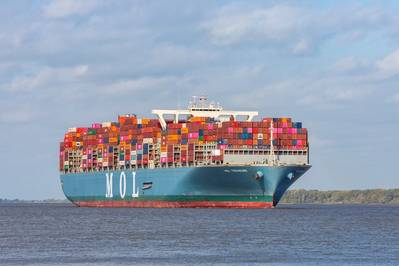Container Rates: Calm Before the Storm?
Stubborn long-term container rates refuse to follow in footsteps of huge spot declines, but change is coming - Xeneta
With dramatic spot rate falls, a non-existent peak season, and easing port congestion freeing up capacity, the scene was set in October for a significant decline in long-term ocean freight rates. However, the latest data from the Xeneta Shipping Index (XSI) reveals global contracted rates fell by only 0.6% this month, following on from September’s 1.1% decline (the first falls since January 2022). That said, the signs of softening fundamentals are, according to Xeneta, “there for all to see.”
Calm before the storm?
“Eyebrows will be raised amongst industry observers this month,” said Xeneta CEO Patrik Berglund.
“Spot rates have plummeted since the summer across key trading corridors, such as the Far East to U.S. West Coast, and long-term rates usually play catch up after a few months. In addition, you have zero sign of peak volumes hitting the waves, as many shippers already have high inventories and are anticipating lower seasonal demand due to the challenging macroeconomic picture. Added to weaker consumer confidence, you also have higher fleet capacity. So, in this context, a mere 0.6% fall looks almost like a ‘win’ for the carriers.”
But, Berglund cautions, will it continue?
Warning signs
Xeneta’s data shows significant drops in long-term contracted rates now emerging on selected, major routes, such as from the Far East into Europe. Although not yet on the scale of the spot collapse, newly contracted long-term rates from the Far East to the Mediterranean have dropped away by 30% since the end of September, also falling by 12.4% into Northern European ports. This has contributed to all active contracts for the two lanes falling by 13.5% and 8.3%, respectively, this month.
Berglund commented, “Even on the routes where we’re seeing robust long-term rates, such as the U.S. East Coast, there’s a question of whether anyone approaching next year’s tenders will agree to them when spot rates are so much lower. What we may well see is shippers looking to transfer volumes to the spot market, spooking carriers desperate to tie-in business. The result? Carriers could be forced to lower those coveted contracted rates.”
Scrap time
If further proof of the turning tide was needed, Xeneta’s CEO also points out that this month saw the first demolition of a containership with a capacity of more than 1,000 TEU since March 2021 (the 32 year old Mathu Bhum).
“The demand for tonnage, which was running so high, is now dissolving,” he says, “and this is likely to be the first of many demolitions as earnings plunge in the face of a weakening market.”
Still standing strong
However, as demonstrated by the XSI’s crowd-sourced data, there isn’t any sense of panic just yet. European imports fared the worst in October’s analysis, with their largest recorded month-on-month drop of 8.3%, but this benchmark remains an impressive 63.7% up compared to January 2022. There was no change on regional export rates, which remain just shy of their August peak.
Contracted rates out of the Far East saw a 2.2% fall this month, with volumes down 1.6% across the first eight months of the year. Despite the latest dip, this export index stands a huge 89.4% up since the start of 2022. The import index edged up 0.2% month-on-month, now up 35.5% against January this year, and 60% up year-on-year.
Money talks
The direction of the US indices bucked the overall trend this month, with both import and export benchmarks making impressive gains. The import XSI registered a 5.2% increase in October, contrasting sharply with huge spot rate falls, while the export index climbed by an even larger 8.3% (up 60% since last year).
“Although the ‘big picture’ points towards a market in decline,” Berglund concludes, “it’s worth remembering just how much freight rates have soared since the start of the COVID pandemic. Even with this month’s dip, the global XSI is higher than it was in July, and in September it stood 112% up year-on-year, so there’s a very long way to fall. Shippers are, relatively speaking, still paying historically high long-term rates. The big question is, will they continue to do so?”














